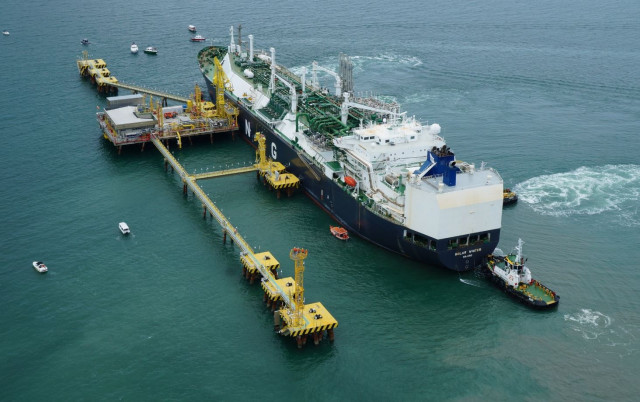LNG, infrastructure projects: Govt shies away from tax exemptions
Petroleum Division sought exemptions for TAPI, IP and LNG projects

Exxon Mobil has pulled out of a major project in Pakistan, in a potential blow to plans to boost imports of LNG after years of winter shortages. PHOTO: REUTERS
The Federal Board of Revenue (FBR) was not in favour of massive tax exemptions, also questioning authority of the Economic Coordination Committee (ECC) of the cabinet to give some relief.
Headed by Prime Minister Shahid Khaqan Abbasi, the ECC deferred the approval of two separate summaries.
The Petroleum Division had requested exemption from withholding tax collection for Pakistan State Oil (PSO), Sui Southern Gas Company (SSGC), Sui Northern Gas Pipelines Limited (SNGPL) and Pakistan LNG Terminal Limited.
It sought adjustment of billions of rupees worth of withholding tax paid by these companies over the past two years. It also demanded reduction in sales tax on the supply and import of LNG.
However, the ECC approved the issuance of sovereign guarantees worth $150 million for opening letters of credit by Pakistan LNG Limited (PLL) in favour of LNG suppliers.
The ECC also allowed the Defence Production Division to enter into a commercial loan agreement with Askari Bank which would save debt servicing cost of the Wah Brass Mills upgrading project.
Against the previous interest rate of 10.65%, the Defence Production Division will arrange the new facility at six-month Karachi Interbank offered Rate (Kibor) plus 0.3%.
The Petroleum Division had sent a summary seeking exemption from taxes and duties on gas infrastructure development projects. These include the North-South Gas Pipeline project, Turkmenistan-Afghanistan-Pakistan-India (Tapi) pipeline project, Iran Pakistan (IP) pipeline project, re-gasified LNG-III project and other similar schemes.
The ECC set up a committee headed by the finance secretary to review the proposals and recommend only those to the ECC that the cabinet body had the authority to waive.
Some of the exemptions can only be approved by parliament, according to an official of the finance ministry who attended the meeting. He said the FBR was also not given appropriate time to study the proposals.
The ECC directed the Petroleum Division and FBR to resolve the outstanding issues. Abbasi is also the minister in charge of the Ministry of Energy, Petroleum Division.
Secretary In charge Petroleum Division Sikandar Sultan Raja had sent the summaries to the ministries concerned at the weekend, giving virtually no time to study the proposals. The Petroleum Division had requested exemptions from tax on the import of LNG, withholding tax on domestic sales, reduction in sales tax on domestic sales and exemption from sales tax and custom duty on the imports of material and machinery for the construction of gas pipelines.
The exemptions were also sought for contractors, sub-contractors and service providers for the gas infrastructure projects.
A major amendment had been proposed in SRO 678 of 2004. The new amendment exempts from taxes on temporary import of plant, equipment, machinery and peripheral infrastructure.
The ECC put off decision on exemptions from federal sales tax and custom duty on the imported plant, machinery and equipment for gas infrastructure projects for large diameter pipelines. It also did not take decision on sales tax exemption for the import of HR coils, line pipe, pylons and plants.
The ECC deferred approval of 10-year tax holiday for the North South Gas pipeline and income tax break for contractors and sub-contractors.
Published in The Express Tribune, November 14th, 2017.
Like Business on Facebook, follow @TribuneBiz on Twitter to stay informed and join in the conversation.



















COMMENTS
Comments are moderated and generally will be posted if they are on-topic and not abusive.
For more information, please see our Comments FAQ